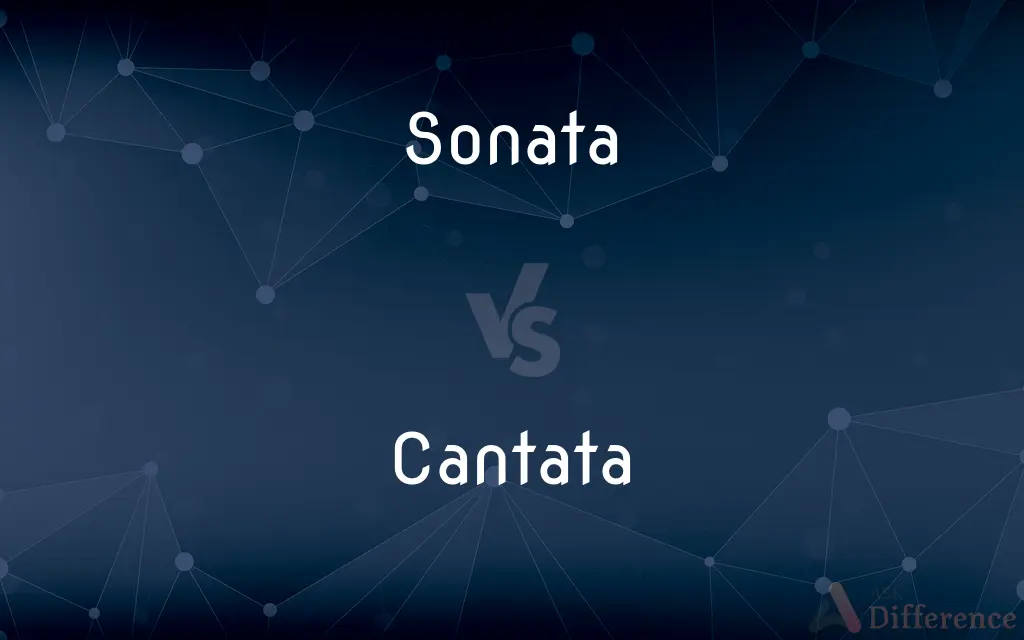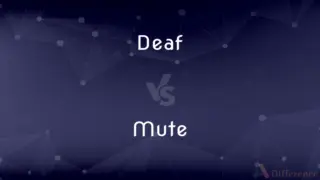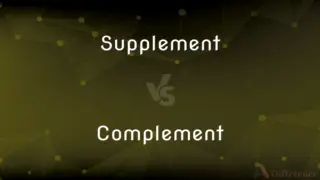Sonata vs. Cantata — What's the Difference?
By Urooj Arif & Maham Liaqat — Updated on April 15, 2024
A sonata is an instrumental composition with multiple movements, typically for solo or small ensembles, focusing on musical structure and thematic development. A cantata is a vocal composition with instrumental accompaniment, narrative in in nature.

Difference Between Sonata and Cantata
Table of Contents
ADVERTISEMENT
Key Differences
A sonata is primarily an instrumental genre in classical music, characterized by its structure and multiple movements, which can include fast-slow-fast sequences or variations. On the other hand, a cantata is a vocal composition that combines singing and instrumental parts, and it is often structured with several movements that include solos, duets, choruses, and instrumental interludes.
Sonatas are typically performed by soloists or small ensembles, such as a piano solo or a violin-piano duo. These compositions focus on the exploration and development of musical ideas, themes, and motifs within a formal structure like sonata form. Whereas, cantatas are performed by larger ensembles that include a choir and orchestra, designed to convey a story or theme, often with a dramatic narrative or religious content.
The term "sonata" historically denotes a piece played as opposed to a "cantata," which means a piece sung. This distinction highlights the instrumental nature of sonatas, focusing on musical technique and expression without lyrics, while cantatas integrate text, making the music serve the words and enhance the storytelling or emotive aspect.
Sonatas evolved during the Baroque period, reaching significant development in the Classical and Romantic periods through composers like Beethoven and Mozart who exploited the form's potential for thematic development and structural complexity. Conversely, cantatas were particularly popular during the Baroque period, with Bach and Handel composing numerous works that utilized choral and solo vocal settings to express religious devotion or secular stories.
While both sonatas and cantatas can be complex and rich in texture, sonatas allow composers and performers to explore deep musical structure and abstract expression through instruments alone. Cantatas, by contrast, are more directly communicative through words and often aim to evoke emotional or reflective responses from the audience, facilitated by the combination of lyrics and music.
ADVERTISEMENT
Comparison Chart
Medium
Instrumental
Vocal with instrumental accompaniment
Components
Multiple movements, thematic development
Choruses, solos, recitatives, often narrative
Typical Performers
Soloists or small ensembles
Choirs with orchestra
Form
Structured, often in sonata form
Varied, can include several distinct pieces
Historical Peak
Classical and Romantic periods
Baroque period
Compare with Definitions
Sonata
A musical composition for one or more solo instruments.
His piano sonata captivated the audience with its complexity.
Cantata
A composition written to be sung.
The church cantata was performed with a full choir.
Sonata
Typically structured in three or four movements.
The sonata's second movement provided a soothing contrast.
Cantata
Combines narrative, solos, and choruses.
The cantata told the story of the composer's life through its lyrics.
Sonata
Explores thematic development and musical ideas.
The sonata form allowed for extensive development of the initial theme.
Cantata
Includes instrumental accompaniment.
The orchestra provided a rich backdrop for the cantata.
Sonata
Often performed in intimate settings.
The chamber sonata was performed in a small, cozy room.
Cantata
Typically structured in several movements.
The cantata featured four distinct sections, each with its own mood.
Sonata
Associated with classical instrumental music.
Beethoven’s sonatas are foundational in classical music studies.
Cantata
Often based on religious or dramatic themes.
Bach's cantatas are often performed during religious services.
Sonata
Sonata (; Italian: [soˈnaːta], pl. sonate; from Latin and Italian: sonare [archaic Italian; replaced in the modern language by suonare], "to sound"), in music, literally means a piece played as opposed to a cantata (Latin and Italian cantare, "to sing"), a piece sung.
Cantata
A cantata (; Italian: [kanˈtaːta]; literally "sung", past participle feminine singular of the Italian verb cantare, "to sing") is a vocal composition with an instrumental accompaniment, typically in several movements, often involving a choir. The meaning of the term changed over time, from the simple single-voice madrigal of the early 17th century, to the multi-voice "cantata da camera" and the "cantata da chiesa" of the later part of that century, from the more substantial dramatic forms of the 18th century to the usually sacred-texted 19th-century cantata, which was effectively a type of short oratorio.
Sonata
A composition for one or more solo instruments, one of which is usually a keyboard instrument, usually consisting of three or four independent movements varying in key, mood, and tempo.
Cantata
A musical composition, often using a sacred text, comprising recitatives, arias, and choruses.
Sonata
(music) A musical composition for one or a few instruments, one of which is frequently a piano, in three or four movements that vary in key and tempo.
Cantata
(music) A vocal composition accompanied by instruments and generally containing more than one movement, typical of 17th and 18th century Italian music.
Sonata
An extended composition for one or two instruments, consisting usually of three or four movements; as, Beethoven's sonatas for the piano, for the violin and piano, etc.
Cantata
A poem set to music; a musical composition comprising choruses, solos, interludes, etc., arranged in a somewhat dramatic manner; originally, a composition for a single noise, consisting of both recitative and melody.
Sonata
A musical composition of 3 or 4 movements of contrasting forms
Cantata
A musical composition for voices and orchestra based on a religious text
Common Curiosities
What distinguishes a sonata from other instrumental pieces?
Sonatas are characterized by their structured form and thematic development across multiple movements.
Are sonatas or cantatas more complex?
Both can be complex in different ways; sonatas in musical structure and development, cantatas in integrating music with text and narrative.
What themes are common in cantatas?
Cantatas often explore religious, historical, or ethical themes, aiming to convey narratives or moral lessons.
How are sonatas and cantatas used in educational settings?
Both are studied for their form, historical context, and musical innovation, often used in music education to teach these concepts.
What is the role of the audience in performances of sonatas and cantatas?
In both, the audience is engaged though in sonatas through abstract musical appreciation, and in cantatas through story-driven musical experiences.
How do performers differ between sonatas and cantatas?
Sonata performers are usually individual instrumentalists or small groups, while cantatas require vocalists and often larger orchestral accompaniment.
What are the key skills for a composer of sonatas?
Mastery in understanding musical structure, thematic development, and instrumentation is crucial.
Can a sonata have a vocal component?
Traditionally, sonatas are purely instrumental, though some modern compositions might incorporate voice as a musical instrument without lyrical focus.
Can sonatas or cantatas include modern elements?
Yes, contemporary composers often incorporate modern techniques and themes into both forms, adapting them to current artistic sensibilities.
How has the reception of sonatas and cantatas changed over time?
Both forms have evolved, with sonatas moving towards more abstract and complex structures and cantatas expanding beyond religious settings.
How long are typical sonatas and cantatas?
Both vary greatly in length but sonatas are often shorter due to their focus on instrumental performance, while cantatas can be longer to accommodate narrative elements.
What educational background is needed to understand sonatas and cantatas?
A basic understanding of musical forms and terms can enhance appreciation, but deep musical training helps in fully appreciating the complexities of both.
Which is more suitable for a large concert hall, a sonata or a cantata?
Cantatas, with their larger ensemble requirements and broader thematic material, are typically more suited to large concert venues.
Are there cross-cultural examples of sonatas or cantatas?
While rooted in Western classical music, both forms have influenced and been influenced by other musical traditions globally.
Share Your Discovery

Previous Comparison
Deaf vs. Mute
Next Comparison
Supplement vs. ComplementAuthor Spotlight
Written by
Urooj ArifUrooj is a skilled content writer at Ask Difference, known for her exceptional ability to simplify complex topics into engaging and informative content. With a passion for research and a flair for clear, concise writing, she consistently delivers articles that resonate with our diverse audience.
Co-written by
Maham Liaqat












































